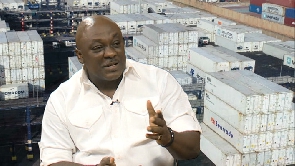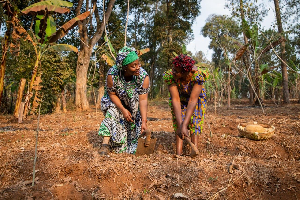A Deputy Minister of Trade and Industry, Carlos Ahenkorah, has called on Ghanaian industries to expedite production in order not only to be buoyant but also contribute to Ghana’s trade sustenance in the wake of the covid-19 pandemic.
“I’d take advantage of this program and encourage our exporters to double their production and look for outside supplies and ship their cargoes outside. Those who are currently not into production can see how they can enter into it as quickly as possible. This is because where we import our cargoes from are on lockdown, so they cannot go to the factory and produce. Now, they would rely on you and accept your product,” he explained.
Speaking on Eye on Port live on national television on Assessing the National and Continental Trade Agenda Before and After the COVID-19 pandemic, the deputy Minister of Trade and Industry who doubles as the Member of Parliament for Tema West, encouraged local industries to take advantage of the more favourable situation in Ghana, to shore up production of locally manufactured products in order to make up for trade deficits incurred as a result of the coronavirus pandemic.
“We believe that this is the time that Africa or Ghana for that matter, should reconfigure its direction to meet post-COVID improvement of our economy. And if we are able to hold on to our own, before the larger economies, are able to overtake COVID, and come back into the limelight, we would have shot forward long before they come,” he said.
Impact of COVID-19
The Deputy Minister who is in charge of Trade, hinted that the aggressive industrialization agenda of government, including the 1D1F program aimed at increasing Ghana’s export base, promote employment, and decrease rural-urban migration among others which were visibly yielding results has significantly suffered as a result of the COVID-19 pandemic.
“If companies don’t work, people don’t get paid salaries, government is deprived of taxes, traders don’t get goods to sell…everybody is unhappy. The seizure in the supply chain, some of the people in this chain would suffer the consequences and that is what I’m talking about,”
Carlos Ahenkorah commended the President of Ghana, for being visionary in his handling of the coronavirus, saying while he does his best to ensure health security, he also takes decisions that ensure continuity of economic activities.
“He has handled this COVID-19 situation by attacking the disease itself with series of regulations and guidelines for us to follow. We started way before a lot of the mature economies even realised that they need to start. Today as we speak industry is working again. If we are able to push more people into production, we stand a bigger chance of us being able to export our goods to the outside world,” he articulated.
Supporting local industries
He said government has made efforts to salvage the magnitude of the setbacks suffered, by offering stimulus packages to industries in addition to the nationwide reliefs on the cost of utilities.
“We are asking the financial institutions to commit about GHC3BN for private sector assistance. That notwithstanding, there is 600M that we are going to roll out for SMEs as stimulus package,” he listed.
He added that in combating the coronavirus, the Ministry of Trade has engaged local entities to produce Personal Productive Equipment, which aside the health benefits, promises a lot of economic gains.
“We are supposed to produce about 3.6 million nose masks here in Ghana. As I speak to you, they are almost nearing half of this production,” he revealed.
The Deputy Minister for Trade and Industry, however noted that his outfit would soon enrol policies that would ensure priority is given to made-in-Ghana products, especially in the retail market to reduce Ghana’s reliance on import.
“We are going to come up with a policy or even a legislation, to ensure that people who are selling locally in Ghana, will find a way to stock some goods that are made in Ghana.”
He encouraged local producers to also do enough to ensure their products are desirable on the market.
“If our local manufacturers are able to up their game, and come up with products that would meet that standard that they expect, I’m sure that even post-COVID we would not need to import much,” he said.
AfCFTA implementation
On the African scene, Carlos Ahenkorah said he is eager for the African Continental Free Trade Agreement to commence as soon as possible, and opined that, he would like for implementation to be on schedule on the July 1st.
“If you ask my opinion, I would say that, I still stick to 1st July. Something has to happen, Africa has to commence trading and I want this thing to happen this year.”
He confirmed that the Nigerian borders remained closed to the movement of goods even before the current COVID-19 crisis, indicating that the sea ports had become the available entry point for goods from other countries.
The Deputy Minister confirmed that the majority of truckers that were stuck at the Nigerian border have returned to Ghana following the President’s call for their return.
He stated that with the commencement of the AfCFTA, such impediments to trade would cease citing the high level of commitment guaranteed by member states.
“Once we commence the AfCFTA, those kind of closure of borders to neighbouring countries to come in and out with cargo is going to be a thing of the past. The AfCFTA frowns upon things like this,” he noted.
Carlos Ahenkorah encouraged citizens to exercise patience during this period of the pandemic, as it may take at best 3 years for Ghana to recover fully from the setbacks that would be suffered to the pandemic.
“It might take this economy three years to recover, and this is very generous. The larger economies, the USA and UK for example, are going to take close to 7-8years to come to life,” he assessed.
Shipping lines helping government
He added his voice to calls for shipping lines to waive demurrages charges at the country’s ports due to the 3weeks lockdown announced by the President.
“They are operating within the remits of this country. If there is an emergency situation, and the president comes out to solicit for some sort of remedial assistance for the citizenry, I think it is incumbent on them, to meet the government halfway,” he expressed.
ICUMS
Commenting on the new Integrated Customs Management System that has been rolled out by the Ghana Revenue Authority, the Deputy Minister expressed the view that it would portray an improved form of the paperless system.
Carlos Ahenkorah emphasized that although the system like any other customs management system, in its beginning stages would have teething issues, users can still have confidence in the reliability of the new system as it would improve trade facilitation.
“If we roll out ICUMS, it is going to the fastest that you ever see in Africa, because now as we speak, compliance is virtual, so I get my UCR, develop my IDF and put it in. Formerly, you have to develop your IDF with GCNet, and you do the UCR with West Blue,” he added.
Business News of Wednesday, 29 April 2020
Source: Eye on Port













